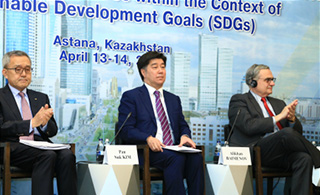The Experts of Public Administration from Asia Gathered in Astana


In Astana, scholars and practitioners of Asian countries are discussing topical issues in the development of public administration, new challenges and innovative approaches. The Eighth Annual Conference of the Asian Association of Public Administration (AAPA) is held in close cooperation with the Regional Hub of Civil Service in Astana and the Academy of Public Administration under the President of the Republic of Kazakhstan.
The conference has been opened by Chairman of the Steering Committee of the Regional Hub of Civil Service Alikhan Baimenov, Rector of the Academy of Public Administration under the President of the Republic of Kazakhstan Fatima Zhakypova, Envoy of the Secretary-General of the United Nations Office for South-South Cooperation Jorge Chediek, and AAPA President Pan Suk Kim.
“Being held in Astana for the first time, this conference emphasizes Kazakhstan’s aspiration for international development and cooperation in the field of public administration. The Regional Hub and AAPA are the platforms, which promote inter-regional and intra-regional cooperation for building effective governance and civil service excellence”, stated Alikhan Baimenov.
Pan Suk Kim emphasized, that “this platform can provide great opportunities for networking and collaborating with scholars and practitioners, as well as scholarly activities that will encourage the development of new professional relationships in the field of public administration in Asia and the rest of the world”.
The High-level Pan-Asian Dialogue Plenary Session gathered the heads of the leading Asian higher education institutions and professional organizations, including those from India, Japan, Kazakhstan, and Korea who had invigorating discussions on the role of governance in achieving the Sustainable Development Goals and the ways to expand partnership in Asia.
The other sessions were devoted to such topics, as public administration in the digital age, research and capacity building in civil service, challenges of local governance for meeting SDGs, and the like. The participants from China, Indonesia, Nepal, Tajikistan, Taiwan, Vietnam and others presented case-studies on the unique practices of the Asian countries, among which were the following: A change in Indian bureaucracy after IT-reforms, Anti-air pollution policies of China, E-Governance in Philippines, Sustainable Smart cities of South Korea, Social welfare policy implementation in Taiwan, and many more.
This event has contributed to the exchange of best practices and expertise, as well as the elaboration of the recommendations for public service excellence in Asia.



